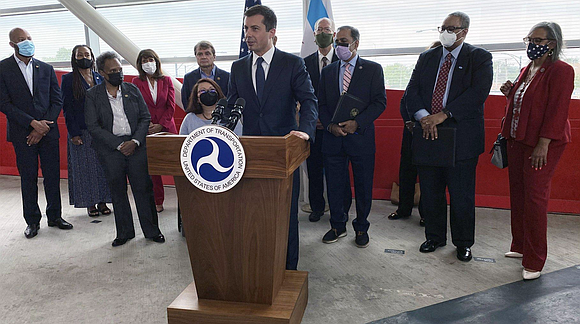On Chicago Visit, Transportation Secretary Buttigieg Promotes Biden Infrastructure Plan
Style Magazine Newswire | 7/23/2021, 10 a.m.

Transportation Secretary Pete Buttigieg says he’s confident the Biden administration’s infrastructure bill will pass Congress, touting on Friday its bipartisan support and saying both the president and the public are impatient to see the deal finalized. But he wouldn’t offer a timeline for when it will clear the House and Senate, both narrowly controlled by Democrats.
“There will be more twists and turns, there’s no question,” Buttigieg said.
During his visit to Chicago, the former presidential candidate toured the 95th/Dan Ryan Red Line station with CTA President Dorval Carter, who called the renovated transit hub a “jewel in the CTA crown.” They were also joined by Mayor Lori Lightfoot, Sens. Dick Durbin and Tammy Duckworth, and Democratic members of Illinois’ congressional delegation, who all touted what they say are the infrastructure effort’s potential impacts on equitable transit, job creation and environmental improvements.
Lightfoot called the $3.5 trillion proposal a step toward prioritizing “reduction of car congestion downtown and combating climate change.” She and Carter both talked up the transit agency’s plans to extend the Red Line to 130th Street, and said money from Washington is key to the success of that project and other CTA renovation efforts.
“Federal funding is the only way that CTA can continue to modernize a system that, in some places, is more than 100 years old,” Carter said. The Red Line Extension is currently in a two-year project development phase necessary to get federal money, which the CTA hopes will pay for about half of the project. Asked if he was confident the project will win approval from Washington, Carter responded with a smile.
“Those of you who know me know that I’m really good at getting money from the federal government,” he said.
The proposed Red Line extension is aimed at bringing transit equity to the Far South Side. Buttigieg applauded that effort, saying it shouldn’t take as long to get from Altgeld Gardens to downtown Chicago by public transit as it does to get from his former home of South Bend, Indiana, to downtown Chicago by car.
Buttigieg visited the 95th Street station to highlight nearly $50 billion in public transit investments included in the infrastructure plan. The bill is also set to have $66 billion in funding for Amtrak and passenger rail. Buttigieg was asked repeatedly about the oft-discussed idea of creating high-speed rail in the U.S. He mentioned the idea of three “showcase” lines, though declined to suggest where they might be located, but said that he and the president share an enthusiasm for the idea.
“In this administration, I know that I can only ever be the second-biggest passenger rail enthusiast, but I work hard to make it a close second,” Buttigieg said. “We as a country shouldn’t put up with being unable to access the level of rail service that people in most developed countries take for granted.”
Buttigieg stopped in Illinois on a tour of three states to promote the infrastructure proposal. Senate Majority Leader Chuck Schumer plans to call the massive bill for a vote next week, Politico reported Thursday, even though text of the legislation has yet to be finalized.
Durbin, the Democrats’ majority whip, expressed confidence that the deal will clear the Senate. He also took a swipe at former Pesident Donald Trump, saying he’d like to compare Biden’s infrastructure plan to his predecessor’s. “But I can’t, because there was no infrastructure program in the previous administration,” he said.
Duckworth, who often uses a wheelchair to get around after losing her legs in Iraq War combat, highlighted funding in the infrastructure bill to make legacy transit stations around the country ADA-compliant, calling it “long past time.”
While the bill contains billions to repair aging automobile infrastructure, Buttigieg also said the investments in transit will be a benefit both to passengers and to the country’s environmental health as a whole.
“It doesn’t have to be called a climate bill to be a climate bill,” Buttigieg said. “Transportation is the biggest emitter of greenhouse gases in the U.S. economy … we (want to) give somebody a choice to take quality, safe, and effective public transit, instead of having to drag two tons of metal with them to wherever they’re going and park it somewhere.”



